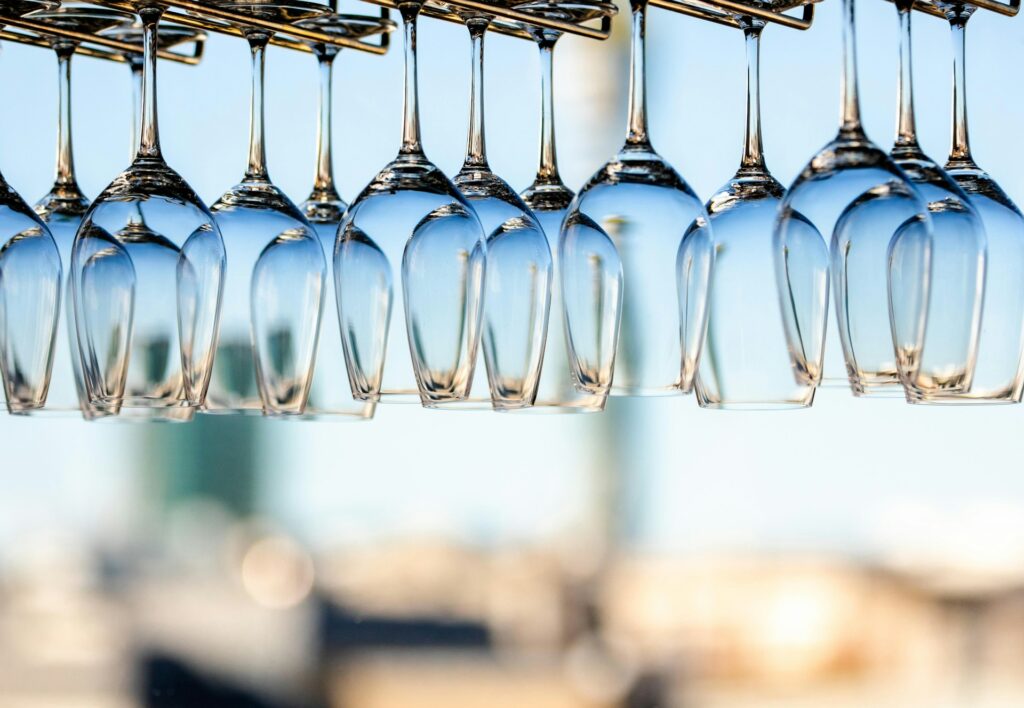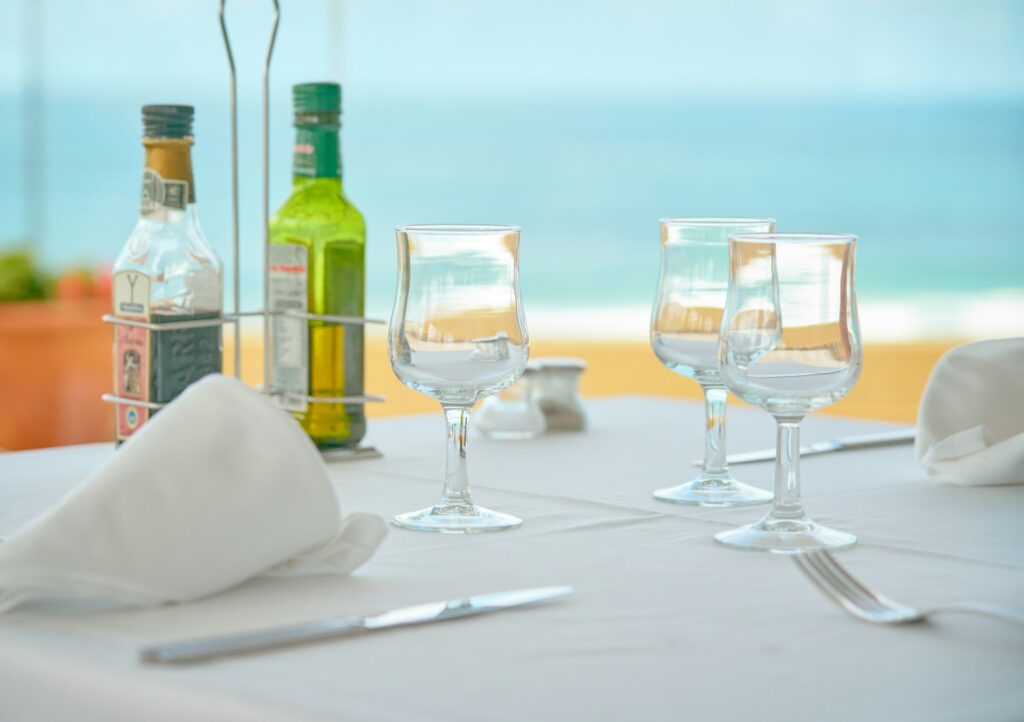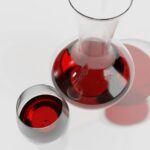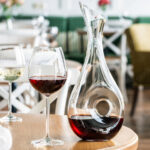Table of Contents
Have you ever hosted a dinner party and realized your wine glasses lacked that perfect sparkle? A clean, clear glass can elevate your wine-drinking experience, showcasing the wine’s true color and allowing aromas to unfold. But how do you achieve those gleaming results without leaving smudges or scratches? It’s all in the technique and the tools you choose. Whether you’re a casual wine drinker or a serious enthusiast, the clarity of the bowl of the glass can make all the difference. Ready for some insider tips? Keep reading to discover the best ways to treat your precious stemware and impress your guests with glasses that shine like diamonds.
Essential Tools and Materials for Wine Glass Cleaning
Before you begin, gather your essentials. You’ll need a gentle cleaning liquid to protect your glassware’s delicate surface. A proper rinse of the glass is crucial; residue from soaps or cleansers can affect the taste of your wine and the appearance of your glassware. And, of course, glassware cleaning isn’t just about the soap you clean with, but also the cloth or brush you use—soft and non-abrasive is the key.
Selecting the Ideal Cleaning Solution
Regarding glassware cleaning, the debate between using regular dish soap or specialized cleaning liquids is real. For hand washing your precious wine glasses, you want a cleaning liquid that won’t leave any lingering odors or tastes. A wine enthusiast knows the importance of a pure tasting experience, and the right cleaning liquid can help shine glassware without compromising it and consequently, the wine’s taste.
Wine Glass Brush Essentials
A good brush can make all the difference when it comes to getting into the bowl of the glass. You’ll want a brush long enough to reach the bottom without risking damage. The right brush should have soft bristles, allowing you to rinse the glass thoroughly without scratching. I’ve learned that the shape of the brush is just as important as its softness—especially for those tricky-to-clean curves. So get a slightly curved one to get to the stubborn crevices.
Drying Options: Air-dry vs Hand-Dry
After washing, the next big question is: to air dry or hand dry? Air drying on a drying rack allows minimal contact, reducing the risk of leaving fingerprints on delicate glasses. However, a wine enthusiast might prefer using a microfiber towel to help avoid water spots while ensuring the glasses are perfectly dry. But remember, when air drying, ensure enough air circulation to prevent musty smells.

Step-By-Step Guide to Handwashing Wine Glasses
Hand washing might seem straightforward, but there’s an art to it. Start with a basin of warm water mixed with just a drop of mild dish soap. Carefully clean the inside and outside, paying special attention to the rim of the glass. For stubborn wine stains, let the glass soak for about 10 minutes before rinsing. And for drying? I’ll share my best tips for a streak-free finish to make your glasses shine like new.
Initial Preparation Tips
Before you begin washing, prepare your sink. A clean, non-abrasive environment is key to preventing scratches. I like creating a diluted solution of distilled white vinegar and warm water to help remove any existing odors or stains. It’s a gentle, effective pre-wash treatment that ensures a clean starting point for hand washing.
Water Temperature in Cleaning
The correct water temperature is crucial when cleaning wine glasses. Too hot, and you risk cracking the glass; too cold, and the stains might not come off as easily. Finding the perfect temperature ensures effective cleaning while preserving the integrity of your glassware. But how do you know if the temperature is just right? Warm – hot enough to remove stubborn, oily stains and cool enough to not make the glass crack.
Drying Without Lint: Achieving a Clear Shine
After washing, drying is where the magic happens. A microfiber towel is perfect for this task—soft, absorbent, and most importantly, lint-free. Using a towel to dry your glasses ensures they’re free of residue and ready for your next pour. Hold the glass firmly but gently as you dry it to avoid any accidents.
The Challenges of Dishwashing Wine Glasses
Dishwashers can be a wine enthusiast’s best friend or worst nightmare. While they offer convenience, there are certain challenges. These include ensuring your glasses are securely upside down without allowing them to touch dishes. But what else should you consider when using this modern appliance?
When using a dishwasher, wine glass accessories can be a game-changer. From specialized racks to protective holders, there are options to keep your glasses safe.
Finding the right dishwasher setting is key to maintaining the shine of glassware. But which cycle is best? And should you use a cleaning brush specifically designed for the dishwasher? Understanding these settings can make a significant difference in the cleanliness and longevity of your glasses.
Precautions When Using a Dishwasher
Using a dishwasher requires certain precautions to ensure your glasses come out clean and undamaged. Always place glasses securely upside down and avoid allowing them to touch dishes, which can lead to breaks. Tammie Teclemariam and Marguerite Preston suggest looking for dishwashers with clips on the racks to keep glasses in place. And remember to adjust the racks to accommodate the height of your glasses to prevent clinking.
Removing Stains and Cloudiness from Wine Glasses
Have you ever pulled out your wine glasses for a special occasion, only to find them cloudy or stained? It’s a common issue, but luckily, there’s a straightforward solution. With the right approach, your glasses can be as clear and sparkling as the wine they hold.
How to Use Vinegar to Address Cloudy Wine Glasses
Cloudiness in the bowl of the glass can dim the shine of your wine glasses, but it’s nothing a little vinegar can’t fix. The trick is to soak your wine glasses in warm vinegar for about 10 minutes. This gentle method helps remove those stubborn mineral deposits that cause cloudiness, giving your glasses their original clarity back. Try this straightforward yet effective trick someday!
Eradicating Tough Red Wine Stains
Red wine stains can be a real headache, but fear not, as there’s a simple concoction just for this. Create a mixture of distilled white vinegar and baking soda to start a chemical reaction that’ll lift those stains right off. Rub the glass gently with the mixture, rinse, and be amazed at how the stains disappear. Isn’t it wonderful when the solution is already in your kitchen cupboard?
Preventative Measures for Stain-Free Glassware
To keep those delicate glasses looking pristine, a proactive approach is best. Rinsing your glass shortly after use can prevent stains from setting in, making your job much easier down the line.
Maintaining the Sparkle: Tips to Keep Wine Glasses Clean Longer
After you’ve got your glasses shining, you’ll want to keep them that way. A quick swipe with distilled white vinegar can help repel water spots and fingerprints, e Have you tried this simple tip to maintain that perfect sparkle?
Storage Solutions to Prevent Dust and Odors
Proper storage is key to keeping your glasses ready for the next pour. Storing your glasses upright in a closed cabinet can help prevent dust and odors from settling in. Have you considered how the right storage can make all the difference?
Regular Cleaning Schedule for Pristine Wine Glasses
Consistency is your friend when keeping your wine glasses in top shape. Whether you choose to air dry them on a rack, use a flour sack towel, or put your wine glasses in the dishwasher, following a regular cleaning schedule will keep them looking their best.
The Do’s and Don’ts of Wine Glass Care
When it comes to wine glass care, knowing what to do and what to avoid can save you a lot of trouble. So why not make your life easier by learning the dos and don’ts?
Common Mistakes to Avoid in Wine Glass Cleaning
Avoid common pitfalls in wine glass cleaning by using a lint-free towel and following reliable cleaning tips. Never use a bottle cleaner meant for kitchen appliances, as they can be too abrasive. Instead, after washing, drain the sink and refill with clean water to rinse, then dry your wine glasses with care.
Best Practices for Wine Glass Longevity
Do you want your wine glasses to last? Handle them with care and wash them soon after use. This not only keeps them clean but also helps avoid the kind of damage that can occur when they’re left unwashed for too long.

Specialized Glassware Cleaning Techniques
Each type of glass may require its cleaning technique to keep it looking new. Are you ready to learn more about the specialized care your glassware deserves?
Handling Delicate Stemware With Care
Delicate stemware requires a gentle touch. Always hold the glass by the bowl, not the stem, to minimize the risk of breakage. Have you ever learned this lesson the hard way?
Cleaning Techniques for Varied Glass Types
Different glass types may need different cleaning techniques. Whether it’s a robust Bordeaux glass or a slender flute, each has its own needs for optimal care. You may need to adjust your cleaning method based on the type of glass.
Customized Cleaning for Premium Mouth Blown Glassware
Premium mouth-blown glassware is a treasure in any collection and demands the utmost care. Customized cleaning techniques ensure that these delicate pieces are preserved for years. Have you experienced the beauty of handcrafted glassware?
Frequently Asked Questions
1. How do you remove stubborn stains from wine glasses?
Stains from red wine can be a challenge, but they’re not invincible. Start by soaking the glasses in warm water with a splash of white vinegar. If the stain persists, make a paste of baking soda and water, apply it to the stain, and gently rub with a soft cloth. Rinse thoroughly afterward. Remember, using abrasive materials like steel wool can scratch the glass, so stick to softer options.
2. Is it better to hand wash or use a dishwasher for wine glasses?
The best method depends on your glasses. If they are dishwasher-safe, ensure they’re placed securely and not touching each other to avoid breakage. Use a gentle cycle and skip the heated dry option. For delicate stemware, handwashing is the safer bet. Use warm water, a small amount of mild dish detergent, and a soft sponge. Be gentle to preserve the clarity and luster of your glasses.
3. Can you prevent wine glasses from getting cloudy?
Yes, cloudiness can often be prevented with proper care. Use soft water for washing to minimize mineral build-up. If your water is hard, consider adding a little vinegar to the rinse water. Dry glasses immediately with a lint-free kitchen towel to avoid water spots. Also, storing glasses upside-down can trap moisture, leading to cloudiness; instead, store them right-side-up in a dust-free cabinet.
4. What’s the best way to store wine glasses to keep them clean?
Store your glasses in a clean, dust-free environment, ideally a closed cabinet. Make sure they are completely dry before storing them to prevent musty odors. Avoid areas with strong smells or where the glasses might absorb odors, as this can affect the taste of your wine. Some wine enthusiasts also use a cabinet with a glass door to display their glasses while keeping them dust-free.
Wrapping Up the Perfect Shine on Your Wine Glasses
After meticulously following the steps to clean your wine glasses, you’re almost ready to put them back in their rightful place among your collections. But how can you ensure they maintain that sparkling clean look? Have you ever held up a glass to the light, only to find smudges left behind? One final wipe with a lint-free kitchen towel can make all the difference, capturing any residual water marks and leaving each glass ready for your next tasting session. Handle your tasting glasses gently; their delicate nature requires a tender touch to avoid any mishaps.
For glasses that are tall for the upper rack of your dishwasher, hand-drying might be the safer bet to keep them gleaming. And when the time comes for your next gathering, your guests will surely notice the care you’ve taken. Isn’t it rewarding when friends marvel at the clarity of their glass, knowing it enhances their wine-tasting experience? Now that you’ve gathered your cleaning supplies and mastered using dish detergent and water, are you confident you can clean the glasses to a perfect shine every time? Share your sparkling success stories and any tips you’ve discovered along the way—we’d love to hear how your wine glasses are the toast of the town!

Sed non elit aliquam, tempor nisl vitae, euismod quam. Nulla et lacus lectus. Nunc sed tincidunt arcu. Nam maximus luctus nunc, in ullamcorper turpis luctus ac. Morbi a leo ut metus mollis facilisis. Integer feugiat dictum dolor id egestas. Interdum et malesuada fames ac ante ipsum primis in faucibus.




